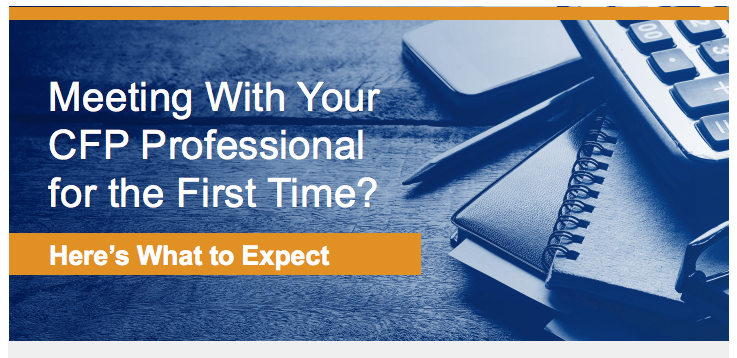Meeting With Your CFP Professional for the First Time?

Meeting With Your CFP Professional for the First Time? Here’s what to expect
Congratulations! You’ve decided to take control of your financial life. You’ve researched your options, asked a lot of questions, and found the right CERTIFIED FINANCIAL PLANNER professional to help you plan for your financial future. As you prepare for your first meeting as a client, it’s likely you have even more questions, and if so, you’re not alone. Many clients of financial planners aren’t sure what to expect, how much to divulge, or even what documents to bring to their first official meeting.
While every financial planner and firm are different, most follow a common general framework based on the six-step financial planning process. The first step often involves something called a ‘discovery’ meeting, in which the financial planner and the client form a basis for their relationship. It’s an opportunity to build trust, understand problems and priorities, and establish a roadmap for progress toward the client’s financial and life goals. CFP professionals and their firms often have an established process that includes providing a checklist of required documents and information they need to get an accurate picture of a client’s financial situation. While it may seem a bit overwhelming to share your most important financial details with someone you don’t know well, it’s really no different than consulting with a physician on your health. When you engage a CFP professional, you are working with someone who has pledged to place your interests first. Think of it as a financial planner’s version of the Hippocratic Oath.
The Big Picture
When financial planners conduct a discovery meeting, many will ask questions not only about their clients’ financial situation, but also about their personal interests, family and lifestyle. Often, a person’s interests, family or lifestyle can influence their financial goals and decision-making, so having a good understanding of the client’s background may help the CFP professional understand their willingness to take on risk, or the triggers that will make them excited or spark their concern. The goal is to help clients create a plan that will serve them well in good times or bad, so they always feel confident about reaching their goals. Thorough financial planners have a process to securely gather their clients’ information, analyze it, and synthesize their findings into a set of recommendations. After receiving and discussing the recommendations from the financial planner, the client and financial planner discuss how the recommendations can be implemented, and the role each will play in carrying out the plan. The more honest and direct clients are at the beginning of the relationship, the better the financial planner can help them create a sound, actionable plan to help them reach their goals. Although some clients might be hesitant to discuss embarrassing financial mistakes they have made in the past, it’s important for them to share those so the CFP professional can address any consequences of those decisions.
Prepare for Your First Meeting
Before attending your discovery meeting with a CFP professional, take an hour or two to prepare yourself with answers to these potential questions:
Goals
• What do you want your money to do for you? (Would you like a comfortable retirement, or a college education for yourself or your children? Would you like to start a business or buy a home? Contribute significantly to a favorite cause?)
• What are your professional goals?
• What goals do you have for your loved ones?
• What legacy would you ultimately like to leave for your family and the world?
Attitude Toward Money
• Do you consider yourself to be a spender or a saver?
• What drives your decision to spend or save money?
• What scares you about money? What makes you excited?
Process
• How much would you like to be involved in managing your finances?
• How comfortable are you in using technology to access online statements, performance reports, tax returns or other documents?
• What do you expect from your relationship with your financial planner?
Get Organised
Your financial planner may also ask you to bring certain documents to your first meeting. Those could include:
Bank statements from the past year
• Other financial statements, such as loan documents
• Insurance policies
• Tax returns
• Pension or retirement savings account information
• Estate planning documents, such as a will or a trust
• Brokerage statements
Some firms provide a checklist with secure links to enable clients to upload their information prior to the meeting, but you may also bring the actual documents with you, depending on your comfort level. Whichever option you choose, be sure to label your documents and clarify any information that could be confusing.
A Relationship for Life
Although it may seem like a significant time investment or an emotionally taxing experience, being wellprepared for your first meeting sets the tone for a successful, trusting, long-term relationship with your financial planner. The more your financial planner knows about your history, your family, your interests and your financial situation, the better he or she can help you achieve the financial well-being you and your loved ones deserve.